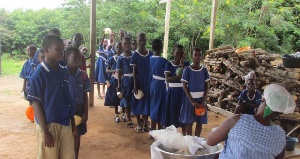A total of 14, 782 pupils in the Ejura-Sekyedumase Municipal Assembly have since January 12, 2017, not been fed following the suspension of the School Feeding Program in the area.
The situation, Kasapafmonline.com understands, has severely affected attendance of the school pupils as parents who cannot afford to provide food have told their children to sit in the house.
On January 12, 2017, the Municipal Coordinating Director of the Ejura-Sekyedumase Municipal Assembly wrote to all the caterers providing services under the School Feeding Program about the suspension of the program until further notice and further invited them to a meeting to discuss the way forward.
This decision by the Assembly, according to sources, was spurred by the impasse between the caterers and some youth in the constituency.
The Member of Parliament (MP) for the area, Hon. Muhammad Bawah Braimah, worried about this phenomenon informed Parliament about the ordeal children in his constituency are going through and prayed to the Speaker to appeal to the Minister for Gender, Children and Social Protection as well as the Minister for Education to intervene.
“Mr. Speaker, this unfortunate development if not addressed immediately may defeat the purpose of the Program and eventually affect quality of education delivery to the pupils of Ejura-Sekyedumase. It is important that going forward all stakeholders work together to free the Program from politicization which has the potential to undermine the effective delivery of the Program.”
“Mr. Speaker, the earlier the School Feeding Program is resumed, the better for educational delivery in the constituency because a visit to the affected schools have shown low attendance at schools and truancy in the constituency,” he noted in a statement he delivered on the floor of the House, Friday.
He also called on the government and all stakeholders including the Select Committee on Education to, as a matter of urgency, look into the matter to get the Ejura-Sekyedumase Municipal Assembly to resume the operations of the School Feeding Program.
In 2005, the government realized that public basic school enrollment, attendance and retention was very low and this was partly attributed to the inability of some parents to provide meals to their wards during school hours.
Government therefore found it necessary to introduce the School Feeding Program, with support from the Dutch Government. The Program is an initiative of the Comprehensive African Agricultural Development Program, pillar 3 (CAADP) which seeks to enhance food security and reduce hunger in line with the MDGs on hunger, poverty and malnutrition.
General News of Friday, 17 March 2017
Source: kasapafmonline.com

















